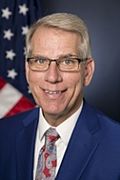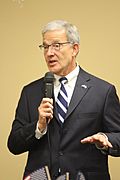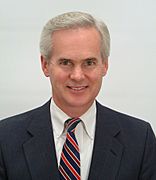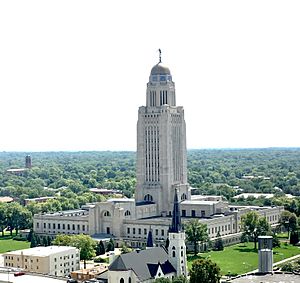Government of Nebraska facts for kids
The Government of Nebraska helps run the state of Nebraska. It's set up by the Nebraska Constitution. This government is like a democracy, similar to the Federal Government of the United States. It has three main parts: the executive, legislative, and judicial branches. These parts work together but also check each other. This system is called "checks and balances." It makes sure no single part has too much power. Nebraska's state government is based in Lincoln, which is the state capital.
Contents
- Executive Branch: Leading the State
- The Governor: Nebraska's Top Leader
- Lieutenant Governor: Second in Command
- Secretary of State: Managing State Records
- Attorney General: Nebraska's Chief Lawyer
- State Treasurer: Handling Nebraska's Money
- Auditor of Public Accounts: Checking State Spending
- State Agencies: Helping Nebraska Run Smoothly
- Legislative Branch: Making Nebraska's Laws
- Judicial Branch: Interpreting Nebraska's Laws
Executive Branch: Leading the State
The Executive Branch is like the management team for Nebraska. It carries out the laws. Here are the main elected leaders in this branch:
-
Jim Pillen (R)
Governor
The Governor: Nebraska's Top Leader
The Governor of Nebraska is the main leader of the state. The governor is elected for a four-year term. They can be elected many times, but only twice in a row. To be governor, a person must be at least 30 years old. They also need to have lived in Nebraska for five years.
Before 1966, governors served two-year terms. Then, a change made it four years. Another change in 1966 limited governors to two terms in a row. The lieutenant governor runs for election with the governor. Jim Pillen is the current governor. He is a Republican and started his term on January 5, 2023.
Lieutenant Governor: Second in Command
The Lieutenant Governor is the second most important official in Nebraska. If the governor cannot do their job, the lieutenant governor steps in. This happens if the governor leaves the state or becomes unable to work. The lieutenant governor is elected for a four-year term. This term runs at the same time as the governor's. The current Lieutenant Governor of Nebraska is Joe Kelly. He took office on January 5, 2023.
Secretary of State: Managing State Records
The Secretary of State handles many important tasks. These include elections and registering businesses. They also manage state rules and records. This office helps with international relations too. The current Secretary of State is Bob Evnen.
Attorney General: Nebraska's Chief Lawyer
The Attorney General's office is like the state's law firm. It gives legal advice to the state government. This office is led by the Attorney General. This person is an elected official. The office has many specialized lawyers and staff. The current Attorney General is Mike Hilgers. He started his term on January 5, 2023.
State Treasurer: Handling Nebraska's Money
The Treasurer of Nebraska is the state's chief financial officer. Their main job is to manage state funds. They invest state money and keep accurate records. The office also sends money to local governments. It tracks unclaimed property and helps with investments. The current Treasurer is Tom Briese. He took office on November 1, 2023.
Auditor of Public Accounts: Checking State Spending
The Auditor of Public Accounts checks how the state spends money. This office reviews all state financial activities. It makes sure state agencies follow financial rules. The Auditor also investigates waste, fraud, and mismanagement. This applies to both state and local governments. The current Auditor of Public Accounts is Mike Foley. He started his term on January 5, 2023.
State Agencies: Helping Nebraska Run Smoothly
The executive branch also includes 18 main agencies. These agencies help the governor manage different parts of the state. They include:
- Department of Administrative Services (DAS)
- Department of Agriculture (NDA)
- Department of Banking and Finance (NDBF)
- Department of Corrections (NDCS)
- Crime Commission (NCC)
- Department of Economic Development (NDED)
- Department of Education (NDE)
- Department of Environment and Energy (NDEE)
- Department of Health and Human Services (DHHS)
- Department of Insurance (NDOI)
- Department of Labor (NDOL)
- Department of Military (NENG)
- Department of Motor Vehicles (NDMV)
- Department of Natural Resources (NDNR)
- Department of Revenue (NDR)
- State Patrol (NSP)
- Department of Transportation (NDOT)
- Department of Veteran's Affairs (NDVA)
Legislative Branch: Making Nebraska's Laws
The Nebraska Legislature is also called the Unicameral. It is the law-making part of Nebraska's government. Its members are called "senators." Nebraska is unique because it has only one house for its legislature. Most other states have two. Also, its members do not officially belong to political parties. With 49 members, it is the smallest state legislature in the U.S. The Legislature meets at the Nebraska State Capitol in Lincoln.
Legislature's Powers: What They Can Do
The Legislature is in charge of making laws. It also decides how state money is spent. The governor can say "no" to a bill, which is called a veto. But the Legislature can still pass the bill if three-fifths (30) of its members vote for it. The Legislature can also suggest changes to the state constitution. Voters then decide on these changes.
How Senators Are Chosen and Work
The Legislature has 49 members. They are chosen from different areas of the state. Senators serve four-year terms. Half of the seats are up for election every two years. To be a senator, a person must be a qualified voter. They must be at least 21 years old. They also need to have lived in their district for at least one year. Senators can serve two terms in a row. After four years, they can run again. Senators earn $12,000 a year.
Nebraska uses a special election system. Instead of separate party elections, all candidates run together. The top two vote-getters then run in the final election. There are no official party groups in the Legislature. Members often work together based on their ideas or where they are from. However, most members are known to be either Democrats or Republicans.
The Speaker: Leading the Legislature
The Speaker is the highest position among the members. The Speaker leads the Legislature when the Lieutenant Governor is not there. The Speaker is elected for a two-year term. They decide the order in which bills are discussed. This order can be changed if three-fifths of the members vote to do so. The Speaker is not on any regular committees. The current Speaker is John Arch. He was elected on January 4, 2023.
Judicial Branch: Interpreting Nebraska's Laws
The Nebraska Supreme Court is the highest court in the state. It has a chief justice and six other justices. Justices are first chosen by the governor of Nebraska. Then, they must be approved by voters every six years. Each of the six justices represents a different area of the state. The chief justice is chosen from anywhere in the state.
Nebraska's Supreme Court is different from most states. To say a law is against the constitution, five out of seven justices must agree. Most other states only need a simple majority.
How Justices Are Selected
The court has one chief justice and six associate justices. If a justice position is empty, a special group looks for candidates. This group has lawyers and non-lawyers. They suggest two names to the Nebraska Governor. The Governor then chooses the new judge. If the Governor does not choose within 60 days, the Chief Justice makes the choice.
To keep their job, judges must run in a special election after three years. After that, they run every six years. If a judge gets less than 50% of the votes, they lose their job. Nebraska judges do not have to retire at a certain age. However, they can retire at age 65 or earlier if they have a disability.








